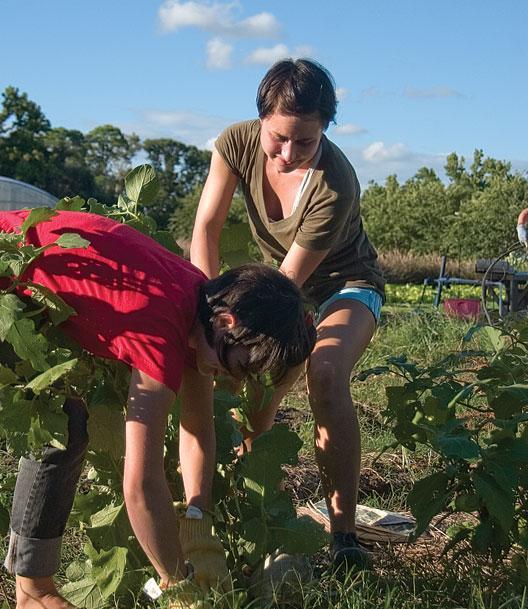Laura Dicks loves cooking with organic produce, but she’s sick of paying high costs at grocery stores. “It tastes better, but I can’t really afford it,” Dicks said. This semester the history senior, along with 25 other community members, rented an organic plot at the Hill Farm Community Garden. The garden, located between East Campus Apartments and the Lod Cook Alumni Center, is a 1/4-acre plot within the 5-acre Hill Farm. It consists of individual and community plots, a section designated for an organic gardening class and a small orchard tended by an agriculture professor. The Hill Farm has existed since the 1920s, but the garden began about 10 years ago, said faculty adviser Carl Motsenbocker.
Hill Farm Community Garden President Kenneth Kuchita said few students have seen the garden. “It’s kind of a well kept secret,” Kuchita said. Motsenbocker said the garden’s popularity has grown during the last few years, and Kuchita said a few gardeners might be turned away this semester. Community members pay $10 per semester to rent a 9-by-5-foot plot, Kuchita said. Gardeners grow everything from tomatoes and eggplants to watermelons and sunflowers. Kuchita said one gardener grew exotic loofah plants last semester. Kuchita said gardeners do not use pesticides, herbicides, fertilizers or plastic twine. He said the garden layers newspaper to retain moisture and guard against weeds and hay to reflect sunlight. Kuchita said the most active gardeners spend up to 20 hours per week in the garden. But some gardeners, like Azure Bevington, reap benefits working as few as one to two hours per week. Bevington, research associate for the Department of Oceanography and Coastal Sciences, lives in an apartment where she cannot grow her own food. “It’s just nice to have fresh vegetables and not have to pay for them and know that they’re organic and local and clean,” she said. Bevington said she plans meals based on the produce she’s grown. Dicks said she harvested 30 pounds of potatoes one year and cooked a lot of beef stew. “We’re basically trying to demonstrate that students can grow food on campus,” Motsenbocker said. He said the garden is not licensed to sell produce, but he hopes to develop a class for students to grow food to sell at farmers’ markets. The garden harvests crops planted by an organic gardening class to donate to the St. Vincent de Paul Dining Room. Alaric Haag, five-year member and Earth Scan Laboratory systems administrator, said the garden donated about five or six truck beds full of greens and other vegetables last semester.–Contact Emily Holden at [email protected]
Students grow own vegetables
September 13, 2009
Ashley Braquet, community member (left), and Meghan Alvendia, biological sciences sophomore (right), help clean up the Hill Farm Community Garden on Monday.






